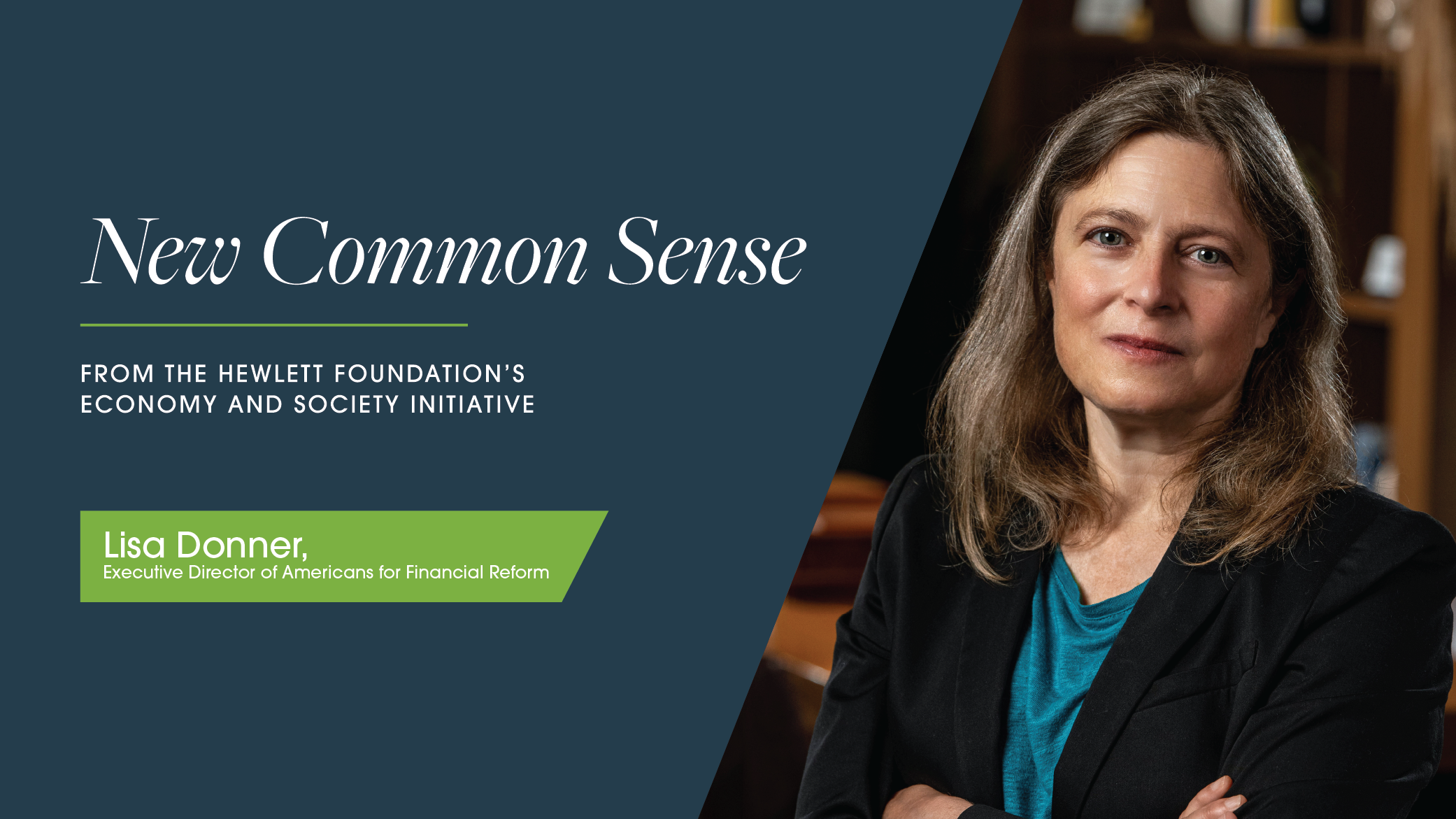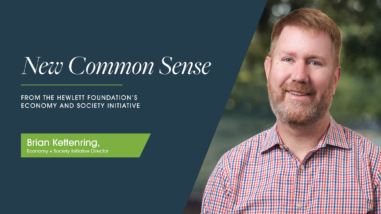Disentangling the economy from neoliberal financialization

Banks, investment firms, and other Wall Street titans have been allowed to secure a heightened level of control over the entire economy. With that control, they extract increasing amounts of wealth from workers and communities, and deploy an increasingly complex array of financial instruments and products that compound their revenue and their power. This contributes to a vicious cycle, where finance fortifies its dominance with the political and concomitant policy influence that only billions can buy.
Decades of deregulation and rewards to the finance sector have led to an increase in the size of the financial industry, and to the creation of banking behemoths that can threaten the financial stability of the entire system. Finance is now double the size it was in the 1970s, and accounts for 25-30% of corporate profits.
At the same time, Wall Street has been able to increase its dominance over decision making at firms that appear nonfinancial, as is the case with several venerable brands, such as Sears, which became heavily reliant on revenue from its Discover credit card; General Motors, whose auto lending business morphed into the troubled Ally Financial; or General Electric’s overreliance on its GE financial arm. This phenomenon extends beyond the firm, creating whole new industries, such as the rapidly expanding and previously nonexistent aircraft leasing sector.
Financial engineering and financial speculation have been rewarded and expanded to the detriment of the “real economy” of producing goods, providing nonfinancial services, inventing things, and responding to social challenges. And money has been pushed to shareholders and executives rather than workers. More of the nation’s wealth has become derived from financial engineering and market speculation, and these earnings and wealth accrue almost exclusively to the very wealthiest people.
In addition to an overall reshaping of the economy that increasingly rewards finance and amplifies inequality and precarity, acute crises are an inevitable result — notably the 2008 financial crisis and the very recent failures of Silicon Valley Bank, Signature Bank, and First Republic Bank. The centrality of finance means that the government responds to each successive paroxysm by rescuing finance, further entrenching a system of privatizing the gains and socializing the losses of speculation and concentration.
The role of finance is also deeply intertwined with racial injustice in the U.S. Historic and continuing discrimination — including by financial firms — means that Black people, Indigenous people, and all people of color have less wealth and are more often targeted with predatory products. The neoliberal system of financial rules then repeatedly rewards wealth with more wealth, and punishes lack of wealth with fees, hidden charges, high-interest rates, abusive collection practices, and even criminalization. And yet somehow, conventional wisdom manages to pretend that none of the byzantine traps created by finance are relevant to deep and persistent disparities in racial wealth, economic and social opportunities, health and wellness, and more.
When authors do focus on it, financialization is frequently identified as central to the logic of neoliberalism and as a major driver of inequality and economic insecurity. Despite this, mainstream economic theory and the bulk of progressive policy and advocacy still act as though the structures and details of finance do not matter much to the broader economy. Surely more attention to what is going on here is warranted when these rules are major determinants of where capital goes (and where it doesn’t), what corporate behavior gets rewarded (and what, if anything, gets punished), and what victories can be won and defended by groups on the ground.
Progressives need to pay specific attention to rethinking, challenging, and changing the rules of finance. If we don’t, we miss a fundamental piece of how neoliberal ideology and policy shapes economies and people’s lives — and we will be repeatedly frustrated in efforts to shift priorities and create alternatives. We can’t build a more just society and economy without winning dramatic change in this sector, and we can’t have a robust and resilient democracy if policymakers can’t or won’t take on Wall Street power in order to do so.
With financialization, we now have an economy in which manufacturers, farmers, ranchers, service providers, and all manner of economic actors respond to the logic and imperatives of finance rather than being served by it, and where the most vulnerable groups pay the heaviest price. We have ended up in an upside-down situation where, rather than the financial sector serving the real economy, the real economy is treated as an opportunity for extraction that serves and is at the mercy of finance.
We have no hope of escaping it — and reorienting policy decision-making to serve human needs — without identifying and undoing crucial policy actions (and inactions) that led us here and keep us here. The list of particulars is so long it is hard to know where to begin.
Large structural changes like the repeal of the Glass-Steagall Act, which once separated commercial and investment banking, created concentrated behemoths that combine speculative and market-shaping activities. A host of exemptions and exceptions in securities regulation have allowed the private — less regulated, less visible, more risky — markets to grow enormously (to $11.7 trillion, or over quadruple what they were in 2010), and incentives in tax and bankruptcy laws that privilege private market transactions and actors have allowed them to escape accountability. Securitization processes and executive compensation systems reward speculation short-termism and payouts to shareholders over investment in long-term productivity.
Despite all the challenges of overcoming the influence, complexity, and obfuscation that are key to how finance protects its own power and privilege, when we fight, we can win. In recent years we have earned some notable successes, despite the odds: The Dodd-Frank financial reform legislation, despite its serious limitations, included hundreds of specific changes for the better (quite a few of which we are still fighting to bring to fruition); the creation of the Consumer Financial Protection Bureau alone has put many billions of dollars back in people’s pockets and prevented hundreds of billions in abuses; as a result of sustained work, for the first time in decades we now have leaders focused on the public interest at multiple financial regulatory agencies enforcing the law and writing new rules.
It matters a great deal that there is a strong basis of public support for this work: Polling in the years since the 2008 financial crisis makes it clear that people across the political spectrum — even in these profoundly polarized times — worry about Wall Street’s impact and are supportive of rules and regulations to curb its power and role. They have experienced the costs of these misalignments in their own lives, and can be called to action around them.
But until we scale the sector, we cannot do enough to capture this potential as a lever for change, and our successes will remain limited. There are so many opportunities to shift individual rules to better serve borrowers and investors, workers and financial stability, and the planet; to shine a spotlight and tell a story that holds policymakers accountable for which side they choose on these crucial economic and racial justice questions; and to use these as pathways to building the capacity and power to make bolder changes.
We have a serious need for big-picture thinking about alternative approaches and systems, but there are also scores of changes we already understand that can both improve people’s lives now and lay the groundwork for more dramatic gains in the future.
For instance, in the consumer finance arena, why do we allow the payday loan industry to maintain a business model that profits from charging 300% interest, and more, to people whose income does not cover their needs, trapping them in increasing debt? Why do we allow auto lenders to use a loan pricing scheme that rewards dealers for putting people in more expensive loans (just like the “yield spread premiums” on mortgages that proliferated in the lead-up to the financial crisis, drove abusive lending, and were finally outlawed in the Dodd Frank financial reform law), and has been repeatedly shown to charge Black borrowers more?
In the investment space, why do we allow financial advisors, who many middle-class working families must look to for guidance on the complexities of saving for a more secure retirement or to pay for their children’s education, to direct clients to investments that include higher fees and/or greater risks, but pay more to the advisors themselves? This approach costs retirement savers of tens of billions of dollars a year, and often causes great anxiety, only in service of financial profits.
Why do we allow exemptions from stock manipulation laws, which enable an increasing focus on stock buybacks and dividends that enrich corporate executives and the largest shareholders, while draining money away from investments in workers, research and development, and improved production? Payments to shareholders — share buybacks and dividends — have exploded: Since 1981, S&P 500 companies have gone from spending approximately 2% of their profits on buybacks to 59% by 2017. Share buybacks, along with debt financing, are associated with a decline in the number of workers and with wage stagnation.
Why have we enabled private equity (PE) — a Wall Street structure created in the last 40 years substantially by grabbing hold of portions of the retirement savings of millions of American workers — to engage in abusive practices across growing sectors of the economy? Private equity now controls more companies than are listed on public stock exchanges and it is a paradigmatic instance of financialization: PE frequently treats “real economy” businesses as vehicles to maximize extraction for its own benefit through financial engineering and regulatory arbitrage. Extensive research has documented how companies experience significant job losses and lower wages as well as increased bankruptcies after acquisition by private equity firms. Other research shows higher costs and worse patient outcomes in multiple health care contexts. PE is driving rent increases, evictions, and reduced housing affordability in the growing set of housing markets where it owns homes.
None of this is inevitable. A long series of policy choices has enabled it, and a series of different choices could rein in abuses and advance equity.
Looking at private equity as an example, these include changes in law, regulation, and enforcement:
- Closing the carried interest loophole, which rewards this approach by giving executives at these firms an artificially low tax rate, and also making tax enforcement changes that would stop PE from systematically avoiding paying taxes current law requires.
- Banning them from paying themselves exorbitant dividends while putting the firms — and the wages and job security of workers at those firms — at risk.
- Requiring them to provide accurate information to (institutional) investors about fees and returns, so that they cannot raise money on the basis of false promises.
- Updating bankruptcy laws so it is harder for them to avoid responsibility for lawbreaking and other harms, as well as harder to load a company with debt, extract resources from it, and walk away from the shell.
- Refreshing merger review standards so that the frequent PE tactic of serial smaller acquisitions does not fly under the radar.
- Closing loopholes to level the playing field between public and private markets.
- A host of reforms in specific sectors that block financial engineering and redirect public resources (like health dollars) to human needs and public purposes.
Thinking big, a public investment bank would provide an alternative source of financing committed to sustainability for workers, communities, and the planet.
The industry is fighting measures like these tooth and nail, but we are making some progress, despite the odds. The SEC proposed a rule requiring accurate information for PE investors. The Biden Administration took a first step with regard to the Wall Street presence in health care by proposing, for the first time, to require comprehensive reporting on ownership of nursing homes (today the government has little idea what facilities are owned or controlled by PE), and next we expect a proposal on staffing ratios that could provide vital protections across the industry, as well as reduce the capacity of PE to extract extra returns at the expense of patients and staff. There is enormous room to build on these starts and win much more.
We cannot replace neoliberalism with something that better serves human flourishing and sustainability without engaging in battles like these. Failing to do so reinforces the story that either (1) the rules that shape the economy and determine winners and losers are entirely beyond anyone’s control and therefore inevitable; or (2) though these are policy choices and we could make them differently, no one is willing to take on powerful interests in order to do so.
We can flip the script and create a virtuous cycle by focusing more attention on reforming finance, through both incremental change and structural transformation, using these victories to make a more liberatory future tangible and possible for all of us.


